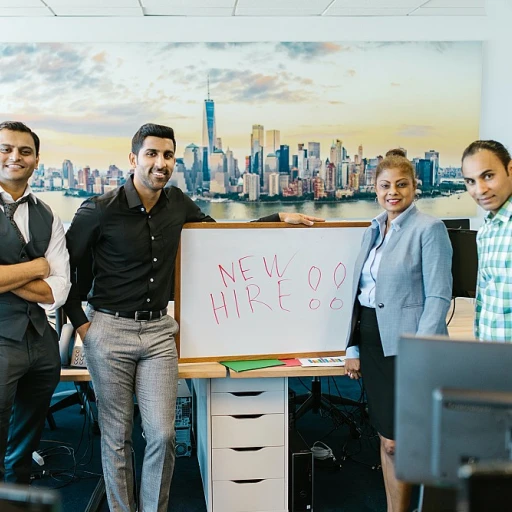
What are EOR Services?
Decoding the Concept of Employer of Record (EOR) Services
Employer of Record (EOR) services are becoming increasingly important in today’s global business environment. These services essentially allow companies to hire employees in a foreign country without needing to establish a local legal entity. The EOR acts as the legal employer, assuming responsibility for payroll, tax, compliance, and employment contracts, thereby simplifying international recruitment and employment.
The core function of EOR services is to manage the complexities of local labor laws and compliance issues. This includes dealing with employment contracts, social security contributions, and employee benefits like health insurance. The importance of this service grows significantly when businesses expand into regions with stringent labor laws, such as the MENA region, which includes countries like the UAE and Saudi Arabia.
By outsourcing these intricate components of human resources, companies can focus on driving their core business competencies while mitigating risk. EOR services are particularly beneficial for facilitating remote work arrangements, as they enable the seamless hiring of talent across borders without the usual bureaucratic hurdles.
Services provided by an EOR may vary slightly based on the local labor laws and the specific needs of the company, but they invariably involve managing legal representation for the company, handling work visas, and ensuring compliance with local employment legislation. This makes EOR services a crucial partner for any company aiming for global expansion.
For companies in the MENA region, engaging with a reputable EOR service can ease the transition into new markets, provide local insights, and help navigate the complex web of regional labor laws. The ability to efficiently manage payroll and tax obligations further underscores the value of these services in maintaining operational efficiency and legal compliance.
It’s essential for businesses evaluating EOR services to consider not only the cost-benefit balance but also the service provider's ability to offer comprehensive support tailored to the company's specific needs. For a deeper understanding of how supply chain outsourcing providers can aid in this process, explore more about their role and impact.
The Importance of EOR in the MENA Region
The Role of EOR in Navigating Complex Recruitment Landscapes
In the MENA region, the dynamic and varied landscape of labor laws and regulations makes the role of Employer of Record (EOR) services particularly critical. These services bridge the gap between global enterprises and local employment compliance, ensuring that each aspect of the hiring process is legally sound and compliant. EOR providers assume the status of what's often termed "legal employer," which allows businesses to navigate the intricate legal entity requirements without establishing their own local entities. They handle payroll management, ensure payment of appropriate local employee benefits, and facilitate social security contributions, streamlining the process of integrating global workforces into local settings. For companies eyeing expansion into the UAE, Saudi Arabia, and other parts of the Middle East, employing an EOR service simplifies the complexities of employment contracts, labor laws, and associated tax requirements. It allows businesses to remain compliant with local payroll and tax regulations, alleviating the burden of maintaining up-to-date knowledge of every jurisdiction's particular needs. EOR services also take charge of visa applications and work permit procedures—essential in areas with stringent immigration protocols. In the MENA region, where laws regarding remote work and expat employment are rapidly evolving, businesses benefit from EOR's expertise in managing these transitions seamlessly. The value of EOR services extends beyond mere compliance. By assuming responsibility for legal and administrative tasks, businesses can focus on their core functions, expanding their reach without the hindrances of bureaucratic processes. Ultimately, these services foster smoother operations across borders, making them indispensable for global expansion in today’s competitive markets. Understanding the role of a Recruiter in job descriptions can further enlighten on how companies can effectively leverage EOR services to enhance their recruitment strategies in the region.How EOR Services Enhance Recruitment Process Outsourcing
EOR Services as a Catalyst for Enhanced Recruitment
In the dynamic landscape of recruitment process outsourcing (RPO), Employer of Record (EOR) services have emerged as a crucial component in facilitating a seamless global expansion. By managing the complexities surrounding legal and compliance requirements, these services provide businesses with the necessary infrastructure to succeed in the Middle East and North Africa (MENA) region. Companies venturing into new territories often face the daunting challenge of understanding and adhering to local labor laws, social security obligations, and employment contracts. EOR services alleviate these burdens by assuming the role of the legal employer, ensuring that businesses remain compliant with local labor laws across multiple jurisdictions, including the UAE and Saudi Arabia. Additionally, managing payroll, tax, and employee benefits for a diverse workforce can be intricate and time-consuming. EOR services are equipped to efficiently handle payroll management, aligning it with local tax regulations and ensuring employees receive the correct benefits and health insurance. This allows businesses to concentrate on their core operations without worrying about the intricacies of local employment practices. Furthermore, the flexibility offered by EOR services is a boon for remote work arrangements and companies seeking a local entity in the Middle East. They provide a robust framework for employment contracts, work visas, and navigating the complexities of creating a legal entity in new markets. By facilitating global compliance, these services grant businesses the confidence to explore new territories without being hindered by administrative concerns. To learn more about enhancing your recruitment process through innovative solutions, explore the benefits of VivaHR in recruitment process outsourcing. EOR services are not just about handling the legal record; they are an integral part of building a globally competitive workforce in the MENA region and beyond.Legal and Compliance Considerations
Legal and Regulatory Framework in the MENA Region
Navigating the legal and compliance landscape in the MENA region is crucial for businesses leveraging Employer of Record (EOR) services. This area is characterized by diverse labor laws and regulatory requirements which can significantly influence how companies manage their global expansion and local entity operations. EOR services play a pivotal role by offering expertise on these local employment laws, enabling businesses to operate within legal boundaries while mitigating risks. In countries like the UAE and Saudi Arabia, labor laws can be complex and vary significantly from Western standards. Therefore, understanding local labor legislation is pivotal. EOR providers are adept at ensuring compliance with employment contracts, tax obligations, and payroll management. This is particularly important in the Middle East, where legal entities must frequently adapt to changes in regulatory policies. One of the primary benefits of EOR services is their ability to act as a "legal employer" on behalf of the company, managing all employment records and social security obligations. This is especially beneficial in the MENA region, where visa and work permit processes can be cumbersome and subject to frequent changes. By managing these compliance requirements, EOR services allow businesses to focus on their core operations, avoiding potential legal pitfalls. Moreover, EOR providers ensure compliance with local health insurance requirements and employee benefits regulations, which can vary extensively between countries in the region. This comprehensive service not only ensures legal compliance but also supports remote work arrangements, which have become increasingly common post-pandemic. In essence, selecting the right EOR partner is critical. They must provide localized expertise and robust compliance frameworks that align with the unique labour laws and regulatory requirements of the Middle East. Companies benefit from EOR services by ensuring all legal aspects, from payroll to tax compliance, are managed efficiently, facilitating smoother global business operations and minimizing the risk of non-compliance. Ultimately, EOR services offer businesses a reliable solution for managing the complexities of employment laws, helping them maintain legal compliance while capitalizing on the workforce potential in the MENA region.Choosing the Right EOR Provider
Key Factors in Selecting an EOR Provider
Choosing the right Employer of Record (EOR) provider is crucial for businesses looking to expand in the MENA region. The right EOR can streamline your operations, ensuring compliance with local labor laws and providing essential services like payroll management and employee benefits. Here are some key factors to consider:
- Compliance Expertise: Ensure the EOR provider has a deep understanding of the legal and compliance requirements in the MENA region. This includes knowledge of labor laws, tax regulations, and employment contracts specific to countries like the UAE and Saudi Arabia.
- Global Reach with Local Insight: A provider with a global presence and local expertise can offer valuable insights into the regional market. They should be able to manage employment records and payroll while adhering to local labor laws and social security requirements.
- Comprehensive Services: Look for EOR services that cover all aspects of employment, from visa processing to health insurance and employee benefits. This ensures that your employees are well-supported, whether they are working remotely or on-site.
- Reputation and Experience: Research the provider’s track record in the MENA region. A reputable company with experience in handling global expansion can offer peace of mind and ensure smooth operations.
- Flexibility and Scalability: As your business grows, your EOR provider should be able to scale their services to meet your changing needs. This includes managing a growing workforce and adapting to new legal requirements.
By carefully evaluating these factors, companies can select an EOR provider that not only meets their immediate needs but also supports their long-term business objectives in the MENA region.
Future Trends in EOR Services
Trends Shaping the Future of EOR Services in the MENA Region
As we look ahead, several trends are poised to shape the future of Employer of Record (EOR) services in the MENA region, particularly as companies focus on global expansion. With businesses increasingly seeking to employ a diverse and distributed workforce, EOR solutions are becoming more crucial than ever.
One significant trend is the emphasis on remote work. The global shift towards hybrid work models has elevated the necessity for EOR providers to offer seamless employment solutions that support remote employees, especially in complex regions like the Middle East. This involves navigating diverse labor laws and ensuring compliance with local regulations.
Another key development is the increasing focus on technology integration. EOR companies are investing in innovative platforms that streamline processes such as payroll management, legal compliance, and employee benefits management. By leveraging technology, EOR providers can offer more efficient services and better employee experiences across a company’s operations in the region.
The growth of the gig economy also influences the EOR landscape, as more companies seek agile, non-traditional workforce solutions. EOR services cater effectively to this demand by acting as the legal employer, managing complexities around employment contracts, and providing benefits like health insurance and social security.
Additionally, as nations in the MENA region, such as UAE and Saudi Arabia, continue to refine their labor laws and regulations, EOR providers must stay ahead of the shifts in policies. This ensures that businesses expanding their operations maintain compliance with regional requirements, thus reducing risks associated with global employment.
Finally, there is a marked increase in the recognition of EOR services as a strategic enabler for businesses entering the MENA market. Companies are looking to expand without establishing a full local entity, making EOR a viable and strategic alternative. As these trends unfold, EOR providers will remain integral to helping businesses navigate the complexities of international expansion, offering reliable support on the ground.













